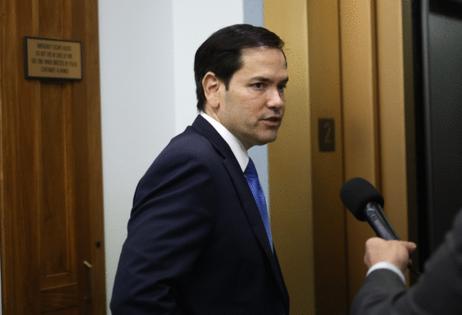Rubio ends adjunct professor contract with Florida International University following secretary of state nomination
Published in Political News
MIAMI — Senator Marco Rubio’s contract as an adjunct professor with Florida International University expired on Christmas Day and won’t be renewed, newly filed financial records show.
The Florida politician first joined the university as a visiting professor teaching politics in 2008, after leaving the Florida House of Representatives. A year after his election to the U.S. Senate in 2010, Rubio began teaching again at the university as a senior fellow for the FIU Steven J. Green School of International & Public Affairs, igniting both intrigue and criticism.
“My contract as an adjunct professor expired on December 25, 2024, and will not be renewed during my time as Secretary of State,” Rubio wrote in a financial disclosure filed this month, which shows he was paid $20,784 in the role this past year.
After president-elect Donald Trump nominated Rubio for Secretary of State, the FIU Green School issued a statement congratulating the senator. The statement said that in his role as a senior fellow, Rubio “has helped shape the next generation of diplomats and leaders.”
“He has been a strong supporter of FIU’s students and faculty, both as a Florida State Representative and U.S. Senator,” the Nov. 14 post on X reads. “He has taught thousands of our students over the last two decades.”
Representatives for Rubio and for the university did not comment for this article.
While the job was cleared by the Senate Ethics Committee, Rubio’s FIU post was a source of some criticism during his early years in the U.S. Senate.
Democrats suggested that the job was a handout in response to donations made to the school by a powerful politician. In 2015, the Tampa Bay Times reported that the senator was doing less work than initially expected of the role. In response, then-advisor for the senator, Todd Harris, attributed the criticism to politics.
“The only people who ever seem to have a problem with any of this are Marco’s political opponents and a couple members of the media,” said Harris.
Colleagues at the university also questioned the role and whether his responsibilities merited the pay he received, according to the FIU student paper, PantherNow.
“How do we justify paying him as much as we do to teach one course?” associate professor Amy Paul-Ward asked then-provost Ken Furton in 2015, the paper reported. “I know there are qualified adjuncts in our school who we have trouble paying $3,000 to teach a course.”
Financial disclosures filed by the senator show that he earned a salary of $69,000 in his first year after starting as a visiting professor between July 2008 and May 2009. The following academic year, he made a salary of $40,000. Records then show that his salary fell significantly: $16,416 in calendar year 2012 after he began working as a senior fellow.
Beyond the criticism, his job garnered interest as journalists sought to capture the intrigue of a U.S. senator teaching politics to college students.
This past fall, Rubio taught an online course on politics with 54 students, according to surveys released by the university.
Rubio consistently received positive reviews from students, with his latest class being rated highly by students who submitted surveys. On a website for students to add feedback for professors, several left positive comments.
“Marco is a good professor,” reads one comment from July 2023. “But all he does is do lectures and all the work is graded by TA’s.”
“Senator Rubio surprisingly provided nonpartisan content each and every lecture that he ran,” reads another from Nov. 2020. “I’d take it again in a heartbeat.”
©2025 Miami Herald. Visit at miamiherald.com. Distributed by Tribune Content Agency, LLC.




























































Comments